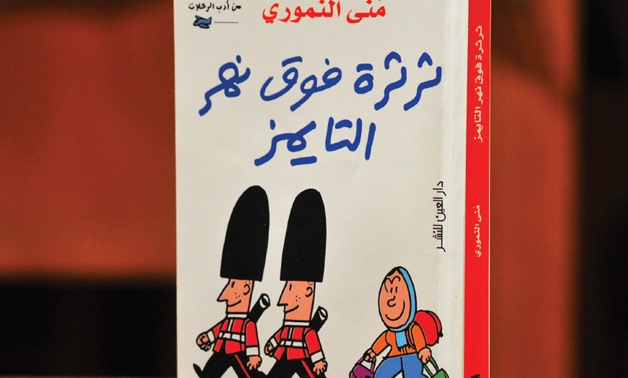
Book cover by Hayssam Samir
CAIRO-11 July 2017: Mona Elnamoury, author of the travel book Tharthara Fawq Nahr El-Thames (Chitchat over the Thames) chose her title carefully.
Echoing the title of Naguib Mahfouz’s novel Chitchat over the Nile was no coincidence, says the university teacher and translator, pointing to the fact that it was written in a time as historically vague as her own, and that similarly vague “questions seem to be hanging in the background.”
As a child, Elnamoury read The Diaries of an Egyptian Youth Washing Dishes in London by journalist Hussein Kadry, and was inspired by the journey Kadry took her on exploring “the foreign.”
Thirty years later, Elnamoury set off on her own voyage, constantly contrasting her journey as an adult with the one Kadry took her on as a child, comparing past to present in a stream of consciousness narrative peppered with intermittent humor.
Several faces and characters tag along with her, their voices popping up at the right moment to enrich the fabric of the narrative with takes on the events of the trip. Her journey starts in Manchester and moves onwards, picking up some details of relevance to contrast her observations with the Egyptian lifestyle and culture.
The reader’s first encounter with the destination begins with a complaint about the weather, interrupted by Madam Nazifa’s critical, witty remarks and Elnamoury’s serious response; Madam Nazifa is her fictional inner critic who picks on her decisions and at the same time alleviates the tension. She also recounts meeting with friends from Egypt and Pakistan, which brought up some questions about the political situation following the January 25 revolution. She comments on the role of the local media in communicating the Egyptian scene to the West— absent then—recalling Kadry’s words about the same inconvenience during his visit to London around the Sixth of October war.
From politics to literature, and particularly the Romantic Movement of English poetry, the reader floats on board the Swan in the magical Lake Windermere in the Lake District, enjoying the breathtaking, serene beauty through Elnamoury’s eyes along with a few lines from Wordsworth.
She further engages the reader with episodic transitions from Westminster Bridge to Hyde Park, a cup of tea watching a squirrel at St. James Park in London and even a glimpse of the Harry Potter world o sorcery.
This swift waltz of tones highlights the shifts in consciousness. The intertextuality Elnamoury utilizes, citing Kadry and referring to Radwa Ashour’s Seraj and her grandmother’s stories about Egypt under the British occupation serves as a commentary on the relationship between the West, represented in Great Britain, and Egypt.
The stylistic blend also reflects the confusion of reading history; for example, admiring Queen Victoria as a devoted wife and queen, and simultaneously deploring imperialism, of which she was an emblem, through the background voice of Radwa Ashour, one of Elnamoury’s favorite authors.
Similarly, she contrasts the dreamy, romantic poet within with the stiff, harsh reality in which she is always drawn, either by the necessities of life and the present moment or by others’ lack of appreciation to the sacred bubble of a writer’s inner eye and daydreams.
To Elnamoury “all real writers are sensitive, perceptive, sharp and attentive,” a welcome addition being a good sense of humor. “A travel writer always sees her own country contrasted to the discovered country, and humor is a defense mechanism, I think,” she explains.
She reveals her passion about visiting. Latin America and Japan, adding that she “would love to stay as long as it needs to understand enough of the cultures to write about. Human differences and similarities are exhilarating, indeed.”
She describes travel experiences as “the area where one is on the edge of discovering her culture through another culture; her humanity through the humanity of another being and so on.”

Comments
Leave a Comment